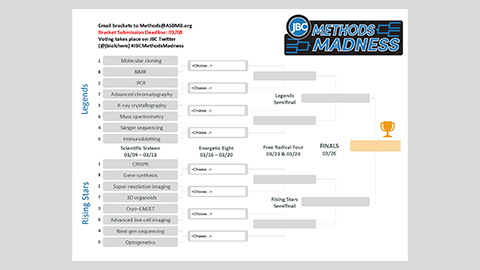It's time to complete your JBC Methods Madness bracket
Calling all scientists! Do you have a favorite method? Is there a biochemical technique you think has had monumental impacts on basic research and deserves a moment in the spotlight? The Journal of Biological Chemistry’s Methods Madness tournament is the chance you’ve been waiting for to voice your opinions. The person with the top-scoring bracket will win a $50 gift card.
How to participate
- Download and fill in your bracket. Use the editable PDF to make your predictions. Save your changes!
- Email your bracket to JBC. Double-check your entry, and then email it to methods@asbmb.org.
- Follow JBC on Twitter and vote for your favorite methods. The JBC Twitter handle is @JBiolChem. They'll be posting weekly polls. Don't forget to participate.
Visit the JBC Methods Madness website for the complete rules.
A note about JBC methods
It's well known that science progresses by building on the shoulders of those who came before. That's especially true for papers that report new tools — genetic constructs, small molecules, model organisms, etc. — that can be directly used by colleagues to jump-start a new project or resolve a technical hurdle. And at JBC, our high standards for rigor and reproducibility mean that readers can trust published tools to work as promised.
— Lila Gierasch, JBC editor-in-chief
Enjoy reading ASBMB Today?
Become a member to receive the print edition four times a year and the digital edition monthly.
Learn moreGet the latest from ASBMB Today
Enter your email address, and we’ll send you a weekly email with recent articles, interviews and more.
Latest in Science
Science highlights or most popular articles

The data that did not fit
Brent Stockwell’s perseverance and work on the small molecule erastin led to the identification of ferroptosis, a regulated form of cell death with implications for cancer, neurodegeneration and infection.

Building a career in nutrition across continents
Driven by past women in science, Kazi Sarjana Safain left Bangladesh and pursued a scientific career in the U.S.

Avoiding common figure errors in manuscript submissions
The three figure issues most often flagged during JBC’s data integrity review are background signal errors, image reuse and undeclared splicing errors. Learn how to avoid these and prevent mistakes that could impede publication.

Ragweed compound thwarts aggressive bladder and breast cancers
Scientists from the University of Michigan reveal the mechanism of action of ambrosin, a compound from ragweed, selectively attacks advanced bladder and breast cancer cells in cell-based models, highlighting its potential to treat advanced tumors.

Lipid-lowering therapies could help treat IBD
Genetic evidence shows that drugs that reduce cholesterol or triglyceride levels can either raise or lower inflammatory bowel disease risk by altering gut microbes and immune signaling.

Key regulator of cholesterol protects against Alzheimer’s disease
A new study identifies oxysterol-binding protein-related protein 6 as a central controller of brain cholesterol balance, with protective effects against Alzheimer’s-related neurodegeneration.

